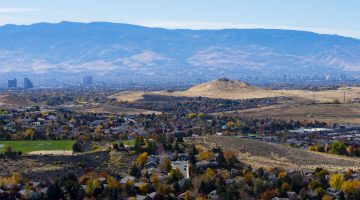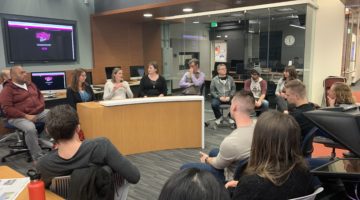
Photo courtesy of Regional Transportation Commission
Bikes sit in their racks at a bike share station in Idaho. The Regional
Transportation Commission is looking to establish its own bike share program in
Reno and Sparks.
By Rocío Hernández
The wheels are rolling in a new Regional Transportation Commission of Washoe County project. The organization is looking into the feasibility of establishing a bike share program in Reno and Sparks.
Existing bike share programs, which have been implemented by over 600 cities worldwide, allow users to rent out bicycles that can be dropped off at various nearby locations. The purpose of the program is to give people another public and convenient transportation mode.
“The idea is that bike share ends up being that last mile of transit opportunity,” said Cynthia Albright, a Stantec Consulting Services senior associate and community development manager involved with the project. “So when you get off a transit or a normal bus there might be a bike share station and you can take that bike to the last mile, either to your place of employment, a destination for shopping, an opportunity to visit the museum or some other destination.”
The project officially began in June 2014, after the City of Sparks asked if a bike share program could be brought to Washoe County. In the project, Albright is joined by Alta Planning and Design, Lucie Melchert Consulting, RTC staff members Joseph Harrington and Rebecca Kapuler, and a stakeholder committee consisting of community members.
The project is currently in its preliminary demand analysis phase as the committee and RTC staff need to determine if Washoe County is capable of supporting a bike share program. They have released an online survey that they hope will tell them if the community sees a need for bike share program, what they would be willing to pay for it and what services they would like to see in the potential program such as helmet rentals.
If team’s research indicates that such a program can succeed in the Reno-Sparks area, they will then determine potential locations for bike stations and how many bikes they will need at the individual stations, a number that will be based on demand.
“We want to start off with a system that is compressed enough to be viable so it’s not spread out,” Albright said. “We are in the phase right now where we are fine tuning the locations of the destinations and what we want to make sure is that we have sufficient input both from stakeholders and staff as well from the community.”
On the RTC bike share study’s webpage, browsers can find information regarding existing programs and the benefits the bike share systems have produced such as improved air quality and user health.
Although, not everyone is sold on the idea. Albright has made contact with cyclists who do not see themselves using the program since they already own a bike. However, she still insists that a bike share program could be useful to them.
“The idea is you can utilize this type of system to get around town both as a resident and as a visitor to explore our community and not worry about [a personal bike] being stolen,” Albright said.
RTC has also contacted downtown casinos and asked them to share the survey with their guests so that tourists’ opinions can be taken into consideration.
In addition to casinos, the committee reached out the members of the University of Nevada, Reno community during an informational session held on campus last month. While she is unsure of whether students will support the idea, Albright considers that university faculty and staff can benefit from a bike share program.
“We are really hoping that the employees and the faculty at UNR might use it to either run errands on lunchtime and/or attend meeting during the day from the main part of campus to downtown Reno,” Albright said.
Jean Paul Torres, former president of the Campus Cycling Coalition and a current member of the Campus Bicycle Committee at the University of Nevada, Reno, does believe students will be interested in using the bike share program. Torres was first introduced to the concept while studying abroad in France. As a student with few transportation options, the bike share program made traveling from his university to downtown easier.
He believes that a bike share system in Reno would make cycling an accessible transportation alternative to UNR students.
“[The Campus Cycling Coalition] knows that sometimes there are barriers to getting on a bike such as not having enough experience with riding or not having a bicycle to begin with,” Torres said. “City planners are aware of some barriers that exist and with the bike share system which basically opens it up to any user that is interested in getting around in bike and just wants to try that out.”
Harrington said that a bike share program aligns itself well with the recent university master plan, which emphasizes a need for multi-modal transportation, especially affordable options.
“One of the City of Reno’s goals is to be recognized as a university town and integrate the university more with the downtown and MidTown and that’s what these projects are really all about because you can’t have that connectivity without great transportation for people to move easily [and] safely in various different ways from the university all the way to south of downtown,” Harrington said. “I think more and more millennials and more and more students are choosing to get around in ways besides vehicles and we want to make sure that we have those amenities available to them.”
Because the project is still in an early planning phase, RTC said that participation in the survey will be essential for the it to be able to determine what kind of bike share system will work best in the region.
“We want it to be a unique system,” Harrington said. “We are trying to create something that is more connected and that really fosters economic activity, educational opportunities and just a really great quality of life.”
Rocío Hernández can be reached at rhernandez@sagebrush.unr.edu and on Twitter @rociohdz19.











